“Can you sleep in a hyperbaric chamber?” is a question many people have when exploring the potential of hyperbaric oxygen therapy (HBOT). These chambers create a pressurized environment where oxygen absorption may increase, possibly supporting recovery, wellness, and overall vitality.
In this article, we’ll explore the key considerations around extended use of hyperbaric chambers, including possible benefits, safety factors, and the role of professional guidance. Readers interested in whether overnight or prolonged sessions are appropriate will gain insights into what current understanding suggests. Keep reading to dive deeper into these areas.
What Happens Inside a Hyperbaric Chamber?
A hyperbaric chamber creates an environment where air pressure is higher than what we normally experience. This pressurization allows more oxygen to dissolve into the bloodstream, which is then carried throughout the body. HBOT sessions have been studied in relation to certain medical conditions, though many people today explore them for wellness or recovery purposes as well.
Understanding what happens inside the chamber is important when asking, “Can you sleep in a hyperbaric chamber?” Sleeping would mean being inside for much longer than a standard session, which is why safety, comfort, and medical guidance are critical, especially for those considering a home hyperbaric chamber.
Can You Sleep in a Hyperbaric Chamber?
So, can you sleep in a hyperbaric chamber safely? In most cases, HBOT sessions typically last from 60 to 120 minutes. However, some individuals do rest or nap during their sessions, and others have explored the idea of overnight use.
Sleeping inside a hyperbaric chamber may offer potential benefits, such as extended oxygen exposure, but it also raises questions about safety, supervision, and suitability for each individual. Because of these variables, it’s best to discuss the idea with a qualified healthcare provider before considering longer sessions.
Related article: Best Hyperbaric Chamber for Home Use: A Smart Wellness Investment
Potential Benefits of Sleeping in a Hyperbaric Chamber

If you’ve asked, “Can you sleep in a hyperbaric chamber for wellness support?”, the possible benefits often highlighted include:
-
Reduced fatigue – Extra oxygen exposure during hyperbaric sessions may help the body feel more energized, supporting reduced tiredness in daily routines, work demands, or during recovery from physical stress.
-
Muscle recovery – Athletes and fitness enthusiasts sometimes use HBOT as a complementary approach to help muscles recover faster following strenuous exercise, promoting reduced soreness and quicker return to training.
-
Circulation support – Longer sessions in a chamber may encourage consistent oxygen delivery across tissues, which could support cardiovascular function, overall circulation efficiency, and tissue repair in wellness or recovery practices.
That said, while some report positive effects, these outcomes are not guaranteed. It’s important to approach sleeping in a hyperbaric chamber as a complementary wellness option rather than a replacement for professional medical care.
Related article: Hyperbaric Chamber for Decompression Sickness Relief: A Complete Guide
Risks and Safety Considerations
Although many consider HBOT relatively low risk when used properly, asking “Can you sleep in a hyperbaric chamber” also requires an honest look at possible concerns. Risks may include:
-
Ear or sinus discomfort – Pressure shifts in the chamber may create temporary ear or sinus pain for some users, usually manageable with techniques like swallowing, yawning, or equalizing pressure gradually.
-
Oxygen-related complications – Breathing concentrated oxygen without proper guidance can present risks, underscoring the importance of trained supervision and adherence to safety protocols during any type of hyperbaric oxygen therapy session.
-
Safety issues – Spending extended, unsupervised time in a chamber may raise potential hazards, emphasizing the need for responsible use, monitoring, and professional advice to maintain safe and effective experiences.
Individuals with untreated pneumothorax, uncontrolled lung disease, or certain sinus or ear conditions should avoid HBOT unless cleared by a medical professional. Always consult a healthcare provider before exploring longer or overnight sessions, especially if you’re considering whether to purchase a hyperbaric chamber for personal use.
Hyperbaric Chambers You May Want to Shop
Explore MoreProduct Spotlight: Options for Sleeping in a Chamber
For those who still wonder, “Can you sleep in a hyperbaric chamber at home?”, selecting the right equipment is crucial. Two main categories are available:
-
Soft Hyperbaric Chambers – These fabric-based designs generally operate at lower pressures, making them more accessible for personal or wellness use. Their portability and comfort may appeal to those curious about extended sessions. You can also explore rental hyperbaric chambers to experience HBOT before committing to ownership.
-
Hard-Shell Hyperbaric Chambers – Built with steel or acrylic, these chambers often support higher pressures and are commonly found in clinical settings. They provide a more controlled environment, which may be preferred for supervised use. Airvida Chambers also offers hard shell hyperbaric chambers for those exploring ownership options.
Choosing the right chamber depends on personal goals, space, and medical guidance. Soft-shell designs may suit home use, while hard-shell units provide higher pressure options. Budget, frequency of use, and professional advice all help ensure a safe, suitable choice.
Who Might Consider Sleeping in a Hyperbaric Chamber?
People who ask, “Can you sleep in a hyperbaric chamber?” often include:
-
Athletes seeking extended recovery options.
-
Wellness enthusiasts interested in potential oxygen-related benefits.
-
Individuals with ongoing care plans, exploring whether HBOT could complement existing routines.
Still, it’s important to emphasize that overnight sessions should not be attempted without first seeking medical approval.
Alternatives to Overnight Use
While sleeping inside might sound appealing, most people can gain benefits through standard session lengths. Instead of asking only, “Can you sleep in a hyperbaric chamber?”, consider whether shorter, consistent use could be a more practical and safer option.
Regular sessions lasting 60–90 minutes may be sufficient to support wellness goals. These alternatives reduce risks while still offering the opportunity to experience the potential benefits of HBOT.
Expert Guidance: Why Professional Input Matters
When exploring whether you can sleep in a hyperbaric chamber, professional guidance should always be the deciding factor. Doctors or specialists can evaluate your health, medical history, and goals to determine whether extended sessions are suitable.
Even if you’re primarily interested in wellness benefits, integrating HBOT into your life is safest when supervised by someone with experience in hyperbaric medicine.
Conclusion: Is Sleeping in a Hyperbaric Chamber Right for You?
The idea of sleeping in a hyperbaric chamber has gained attention as wellness enthusiasts and public figures experiment with longer sessions. While the thought of resting in a pressurized environment may sound intriguing, it raises important questions about practicality, comfort, and safety.
So, can you sleep in a hyperbaric chamber safely? The answer depends on individual health, supervision, and goals. While some may find extended sessions appealing, the potential risks highlight the importance of professional consultation before trying it. For details on the products featured in this article, we encourage you to reach out to Airvida Chambers for personalized guidance and support.
FAQs
Can you sleep in a hyperbaric chamber every night?
Some individuals explore frequent use, but sleeping in a hyperbaric chamber every night isn’t widely recommended without professional guidance. Extended exposure may increase risks, so it’s important to discuss frequency with a healthcare provider before making it part of daily life.
How long can you be in a hyperbaric chamber?
Typical sessions last 60 to 120 minutes, depending on chamber type and goals. While some explore longer use, such as overnight stays, these should only occur under supervision. Duration should always be tailored to individual health needs and professional recommendations.
Can you be sedated in a hyperbaric chamber?
Sedation is generally avoided during HBOT, as patients need to adjust to pressure changes and communicate with staff. In rare cases, minimal sedation may be considered under strict medical supervision, but it is not common practice for safety reasons.
Why do people sleep in a hyperbaric chamber?
Some choose to sleep in a hyperbaric chamber to potentially extend oxygen exposure, support recovery, or promote relaxation. While reported benefits exist, responses differ widely. Consulting a healthcare professional helps determine whether this approach may suit personal wellness or recovery goals.
Who cannot go into a hyperbaric chamber?
Certain individuals should avoid using a hyperbaric chamber, such as those with untreated pneumothorax, severe ear or sinus issues, or uncontrolled lung conditions. Others may require special precautions. Always consult a qualified healthcare provider before beginning hyperbaric oxygen therapy.
You Might Also Want to Read
From Clinics to Homes: Hyperbaric Chamber Price Insights
Exploring the Top Hyperbaric Chamber Benefits for Long-Term Wellness
Exploring the Potential of Hyperbaric Chamber Treatment
Disclaimer
Airvida and partners’ advice does not constitute medical advice and is intended for informative and educational purposes only, with no medical or non-medical claims being made. While research & studies show the potential Hyperbaric Oxygen Therapy (HBOT) and Hyperbaric Air Therapy (HBAT) may have implied benefits, individual results may vary. It is required by Airvida & Partners to consult with doctors before being approved for Hyperbaric Therapy (HBOT & HBAT). Read More HERE







